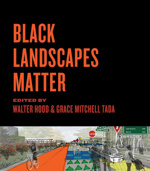Celebrating UP Week (#KeepUp) with Grace Mitchell Tada and Walter Hood, Coeditors of BLACK LANDSCAPES MATTER
Celebrating UP Week (#KeepUp) with Grace Mitchell Tada and Walter Hood, Coeditors of BLACK LANDSCAPES MATTER
UVA Press, a longtime member of the Association of University Presses (AUPresses), is proud to celebrate University Press Week (UP Week). The theme for Tuesday is: SURPRISE!
To celebrate, we asked Walter Hood and Grace Mitchell Tada, coeditors of BLACK LANDSCAPES MATTER, to comment on the success of their book. We thank them for their thoughtful response below.
*************
In the summer of 2020, while reviewing final proofs of Black Landscapes Matter, someone congratulated us. The book, which we had quietly been working on for the past several years, had climbed to the top of a list of best-selling books on Amazon.
There was some panic associated with that news. How could the work live up to expectations that so many people had in that moment? In the aftermath of the most recent horrific injustice within the American landscape—George Floyd’s murder—people were demanding answers and ways out of the current 400-year-long paradigm. Black Landscapes Matter could only open a door toward resolutions and alternative futures. The book itself wasn’t going to alter racialized experiences in a landscape, or change how our public spaces include or exclude or erase certain people, or unspool the blanket of white supremacy threaded into the country’s built fabric. It didn’t seem like enough.
Yet there was little else like it. And any action toward change had to first begin with a conversation.
As the book’s November publication neared, we wondered what the book would be had it been conceived after George Floyd’s death. What would it be if we solicited the authors to write essays in November 2021? What questions would we ask differently? What assumptions would be different? How had our country’s conversations, understandings of history, and willingness to embody the consciousness of others shifted? Or—conversely—sometimes one wonders what, concretely, has changed at all.
But we try to have faith that the country’s consciousness is shifting. The authors of Black Landscapes Matter presaged much of the energy, demands, reflections, and calls to action that transpired last summer. In 2020, the country—and globe—was starting their reckoning on racism, but the authors had been immersed in these realities long before, as their writing affirms. The book just happened to come into the world in 2020.
From Austin Allen and Kofi Boone’s writings questioning the status quo of our country’s design education, to Sara Daleiden’s case study demonstrating the challenges of designing public space in a city scarred by racial trauma: suddenly, many more people than we could have imagined were, too, interested in these issues, opening their eyes to the ingrained racism and injustices of our country’s built environment.
*Black Landscapes Matter *offers just a glimpse into these injustices. We hope the topics raised by the authors have facilitated conversations needed to catalyze change, especially at a moment when so many people are now ready to have those conversations. The authors, all of whom write at the intersection of their personal experience and professional interests, attest to the abiding individual stake all of us have in the design of our built environment. And, though grounded in the specificity of place, they also speak to the fact that nearly any landscape or city in this country possesses a racially unjust history it must face—and its own Black geography to be celebrated and elevated.
Black Landscapes Matter is, like the racial reckonings of 2020, only a starting point; our work continues.
About the Author(s):
Walter Hood is a MacArthur Fellow and Professor of Landscape Architecture and Environmental Planning and Urban Design at the University of California, Berkeley.
Grace Mitchell Tada is an independent scholar, writer, and journalist.
QuickLinks
Find a BookFor Our AuthorsRights and PermissionsRotunda Digital ImprintSupport UVA PressCareer OpportunitiesWalker Cowen Memorial PrizePrivacy PolicyContact Us
- P.O. Box 400318 (Postal)
- Charlottesville, VA 22904-4318
- 210 Sprigg Lane (Courier)
- Charlottesville, VA 22903-2417
- 434 924-3468 (main)
- 1-800-831-3406 (toll-free)
- 434 982-2655 (fax)

the future
of publishing
Affiliates



